CO2 emissions are a constant topic of conversation in our day and age. As a society, we know that we must reduce our CO2 emissions, and that we have to do it quickly. But how can that be achieved? We asked ourselves that very question: “How can we reduce our daily CO2 emissions in an easy way and motivate other people to do the same?”
Our idea
Everyone creates CO2 emissions and it is a huge undertaking to minimise these emissions. For this reason, we wanted to focus on daily CO2 emissions in our project. During a brainstorming session we found ourselves facing some of the following questions: “What exactly are CO2 emissions? How do we create CO2 emissions in our daily lives? Is there a way to reduce our daily CO2 emissions?” With these questions in mind we started researching and found small and easy changes that everyone can make to reduce their own daily CO2 emissions.
It is important to know that the following content is not based on scientific research. Please use critical thinking while reading about our project and don‘t forget that CO2 emissions are a very complex topic.
What are CO2 emissions?
CO2 is the abbreviation for carbon dioxide. CO2 emissions are created through the burning of fossil fuels, such as oil, coal and natural gas and waste materials for energy use. Carbon dioxide is also produced by deforestation and industrial processes.
How do people create CO2 emissions and how do we create CO2 emissions on a daily basis?
During our research we created two focus groups: the people in general and us as individuals. When answering the question of how CO2 emissions are created, we made two lists to be able to differentiate between the two focus groups:
Some causes of human made CO2 emissions
In this article we read about the main causes: Main causes for CO2 emissions (tagesschau.de); here are some key words:
- Burning of fossil fuels -> people do this for heating
- Deforestation -> this means cutting down a lot of trees in the forest
- Transportation -> car, plane, bus, train
- Cement production -> cement is used for many different things, especially in construction, for example building houses
How do we personally produce CO2 emissions?
- We drive a car
- We heat our homes
- We go on holiday by airplane
- We use public transport
These are some direct causes for CO2 emissions. There are indirect causes as well but in our project we focused on the direct causes. If you are interested in the indirect causes you can read more in the following article: indirect causes for CO2 emissions.
How can we reduce daily CO2 emissions?
After conducting our research on how CO2 emissions are created in general and how we personally create CO2 emissions in our daily lives, we started thinking about solutions. We started by making a list of suggestions on how we could reduce our daily CO2 emissions. It was very important to us that the suggestions were easy to implement and did not require big changes. Here are our suggestions:
- We can use public transport more instead of cars. We can also use car sharing when multiple people are going to the same place to fill up the cars, instead of only having one person per car. We can also walk or cycle for short journeys.
- We can turn down the heating. If we feel cold, we can put on another jumper before turning the heating up.
- We can take shorter showers to save water. We can also take less hot showers.
- We can look at our eating habits: eating less meat, not wasting any food, trying to eat local food. There are also options like “too good to go”, which is an app, where you can buy leftover food from local shops and restaurants with a discount, instead of them getting thrown away.
Of course we tried to apply these suggestions in our personal daily lives. We took a few pictures to document the changes we made and would like to share them with you. Maybe this will inspire you too try a few of the suggestions yourself 🙂



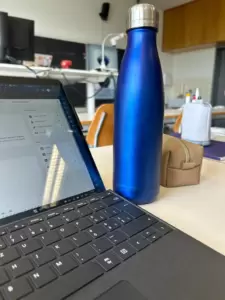




The survey
After closing the survey we started to interpret the results and started thinking about what they mean for us and what we could do to improve.
As you can see in the graph below, most of the people have already heard of CO2 emissions before, which was a good sign for us. This means that there is already a basic level of knowledge there and the problem isn’t that people don’t know about it, it might be that they don’t know how to reduce their emissions.
Not even half of the people who filled out our survey are doing anything specific to reduce their personal daily CO2 emissions. This means that there is still a lot of potential to reduce the emissions and we think that this project could really help to give suggestions on how to reduce the emissions.
What we can interpret from the following question is that there is a lot of motivation to reduce daily CO2, even if less than half of the people are already doing something specific. All of our suggestions seem to be realistic to start doing them on a daily basis. This feedback made us very happy because it means that our project can have an impact on people.
Only 10% of people think that they don’t have any responsibility for solving the problem of CO2 emissions. Obviously that is still too high a percentage and we hope to influence some of those 10% and motivate them to change and see that they too have a part to play in this important issue.
Almost 90% thought that countries and politicians are at least partly responsible for solving the problem. Correspondingly, a large proportion felt that laws and regulations were not strict enough.
We were really positively surprised by the following graph, where we can see that most people already use public transport. But there are still some who use cars or motorbikes, which is understandable as there are some places that are simply not accessible by public transport, or the destination is too far to reach by bike or on foot.
Reflection
The work process between us has demonstrated the power of collaboration in achieving a collective goal. Thanks to conversations and discussions we were able to come up with the concept of our project and the idea of asking people about their knowledge of CO2 emissions was born. It was a really nice experience to see our project come together and being able to work in a well-functioining team.
We took all of the photos that are used ourselves.
We also faced some struggles during this project: unfortunately we were not able to find a collaboration partner. Sadly nobody from India or Dubai wanted to participate in our project so we were not able to add an inernational aspect. We then tried to find an interview partner and asked different journalists at Neue Zürcher Zeitung but they all had to decline the invitation due to a tight time schedule.
Authors: Inês Barroso, Nina Arnold, Alisha Künzi

(Image made with picrew.me)
Sources and further Info
Was nützt es dem Klima, wenn alle… (srf.ch)
The 37 Easiest Ways to Reduce Your Carbon Footprint (columbia.edu)
Climate change: Top 10 tips to reduce carbon footprint revealed (bbc.com)
On-topic posts on dontwastemy.energy
Survey on climate-impacting measures
☷ See the project teams here »
☵ Some words about the contributions »
☴ Our sponsors and partners » (the-horse.education)

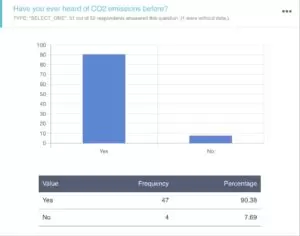
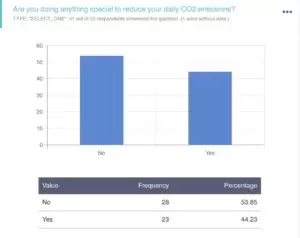
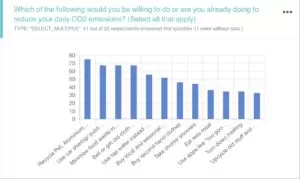
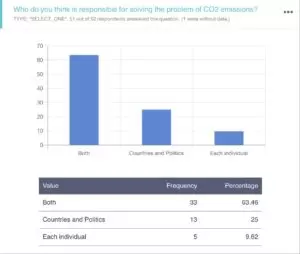

This is a crucial topic, and you did an excellent job of breaking down the complex issue of CO2 emissions into manageable sub-chapters that are easily understandable for all readers. Well done! The survey results offer a clear reflection of Swiss societal habits, which need to be examined and thoughtfully reimagined to build a sustainable and greener future.
I really liked the survey. The whole text was very informative and now i know how i can help the planet. Thanks!
Big shoutout for the authors. Wow!